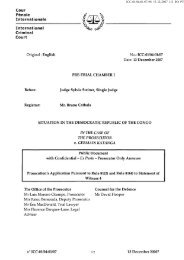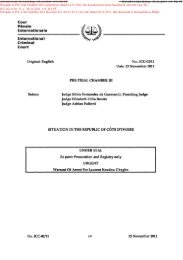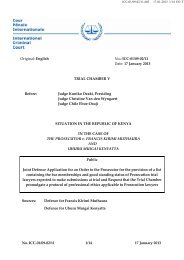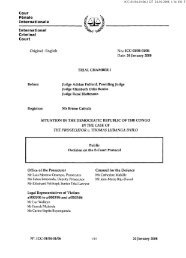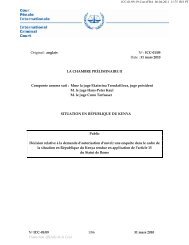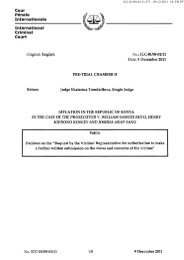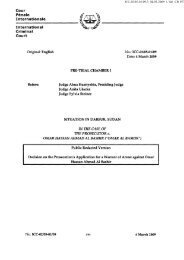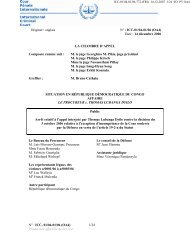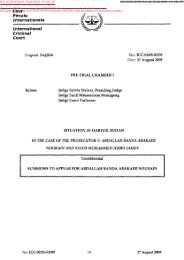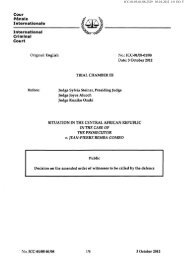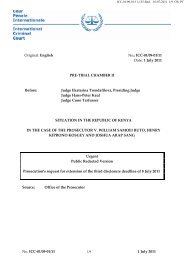Resolution ICC-ASP/11/Res.8
Resolution ICC-ASP/11/Res.8
Resolution ICC-ASP/11/Res.8
Create successful ePaper yourself
Turn your PDF publications into a flip-book with our unique Google optimized e-Paper software.
Advance version<strong>ICC</strong>-<strong>ASP</strong>/<strong>11</strong>/20<strong>Resolution</strong> <strong>ICC</strong>-<strong>ASP</strong>/<strong>11</strong>/<strong>Res.8</strong>Adopted at the 8th plenary meeting, on 21 November 2012, by consensus<strong>ICC</strong>-<strong>ASP</strong>/<strong>11</strong>/<strong>Res.8</strong>Strengthening the International Criminal Court and the Assembly ofStates PartiesThe Assembly of States Parties,Mindful that each individual State has the responsibility to protect its populationfrom genocide, war crimes, and crimes against humanity, that the conscience of humanitycontinues to be deeply shocked by unimaginable atrocities in various parts of the world, andthat the need to prevent the most serious crimes of concern to the international communityand to put an end to the impunity of the perpetrators of such crimes is now widelyacknowledged,Convinced that the International Criminal Court (“the Court”) is an essential meansof promoting respect for international humanitarian law and human rights, thus contributingto freedom, security, justice and the rule of law, as well as to the prevention of armedconflicts, the preservation of peace and the strengthening of international security and theadvancement of post-conflict peacebuilding and reconciliation with a view to achievingsustainable peace, in accordance with the purposes and principles of the Charter of theUnited Nations,Convinced also that there can be no lasting peace without justice and that peace andjustice are thus complementary requirements,Convinced further that justice and the fight against impunity are, and must remain,indivisible and that in this regard universal adherence to the Rome Statute of theInternational Criminal Court is essential,Welcoming the Court's central role as the only permanent international criminalcourt within an evolving system of international criminal justice,Underscoring the importance of the tenth anniversary of the entry into force of theRome Statute and the establishment of the International Criminal Court in 2012 and thecontribution of the International Criminal Court to guarantee lasting respect for and theenforcement of the international justice,Noting the primary responsibility of national jurisdictions to prosecute the mostserious crimes of international concern and the increased need for cooperation in ensuringthat national legal systems are capable of prosecuting such crimes,Underscoring its respect for the judicial independence of the Court and itscommitment to ensuring respect for and the implementation of its judicial decisions,Taking note with appreciation of the annual United Nations General Assemblyresolutions concerning the Court,Recalling the success of the first Review Conference of the Rome Statute, held inKampala, Uganda, from 31 May to <strong>11</strong> June 2010, as well as the renewed spirit ofcooperation and solidarity and the firm commitment to fighting impunity for the mostserious crimes of international concern to guarantee lasting respect for the enforcement ofinternational criminal justice, reaffirmed by the States Parties in the Kampala Declaration,Recalling the decision by the Assembly of States Parties (“the Assembly”) toestablish a representation of the Court at the African Union Headquarters in Addis Ababa, 1Reiterating that the presence of a liaison office of the Court at the Headquarters ofthe African Union in Addis Ababa would promote dialogue with the Court and theunderstanding of its mission within the African Union and among African States,individually and collectively,1 Official Records … Eighth session … 2009 (<strong>ICC</strong>-<strong>ASP</strong>/8/20), vol. I, part II, <strong>ICC</strong>-<strong>ASP</strong>/8/Res.3, para. 28.20-E-0<strong>11</strong>212 45
<strong>ICC</strong>-<strong>ASP</strong>/<strong>11</strong>/20Advance versionAppreciating the invaluable assistance that has been provided by civil society to theCourt,Conscious of the importance of equitable geographical representation in the organsof the Court, and in the work of the Assembly and its subsidiary bodies,Conscious also of the importance of gender balance in the organs of the Court, andto the extent possible, in the work of the Assembly and its subsidiary bodies,Mindful of the need to encourage the full participation of States Parties, Observersand States not having observer status in the sessions of the Assembly and to ensure thebroadest visibility of the Court and the Assembly,Recognizing that victims’ rights to equal and effective access to justice protectionand support; adequate and prompt reparation for harm suffered; and access to relevantinformation concerning violations and redress mechanisms are essential components ofjustice, and emphasizing the importance of effective outreach to victims and affectedcommunities in order to give effect to the unique mandate of the Court towards victims,Conscious of the vital role of field operations in the Court’s work in situationcountries and the importance of stakeholders working together to create suitable conditionsfor field operations,Conscious of the risks faced by personnel of the Court in the field,Recalling that the Court acts within the constraints of an annual programme budgetapproved by the Assembly,Rome Statute of the International Criminal Court1. Welcomes the State that has become a Party to the Rome Statute of the InternationalCriminal Court since the tenth session of the Assembly and invites States that are not yetparties to the Rome Statute to become so as soon as possible;2. Decides to keep the status of ratifications under review and to monitor developmentsin the field of implementing legislation, inter alia, with a view to facilitating the provisionof technical assistance that States Parties to the Rome Statute, or States wishing to becomeparties thereto, may wish to request from other States Parties or institutions in relevantareas;3. Recalls that the ratification of the Rome Statute must be matched by nationalimplementation of the obligations emanating therefrom, notably through implementinglegislation, in particular in the areas of criminal law, criminal procedural law andinternational cooperation and judicial assistance with the Court and, in this regard, urgesStates Parties to the Rome Statute that have not yet done so to adopt such implementinglegislation as a priority and encourages the adoption of victims-related provisions, asappropriate;4. Welcomes the report of the Bureau regarding the implementation of the Plan ofaction for achieving universality and full implementation of the Rome Statute, 2 notes withappreciation the efforts of the Court’s President, the Office of the Prosecutor, the Presidentof the Assembly of States Parties, the Assembly of States Parties, States Parties, and of thecivil society to enhance the effectiveness of universality related efforts and to encourageStates to become parties to the Rome Statute, endorses the recommendations of the report,and requests the Bureau to continue to monitor its implementation and to report thereon tothe Assembly during its twelfth session;Cooperation5. Notes its resolution <strong>ICC</strong>-<strong>ASP</strong>/<strong>11</strong>/Res.5 on cooperation;2 Report of the Bureau on the Plan of action for achieving universality and full implementation of the RomeStatute of the International Criminal Court (<strong>ICC</strong>-<strong>ASP</strong>/<strong>11</strong>/26).46 20-E-0<strong>11</strong>212
Advance version<strong>ICC</strong>-<strong>ASP</strong>/<strong>11</strong>/206. Calls upon States Parties to comply with their obligations under the Rome Statute, inparticular the obligation to cooperate in accordance with Part 9, encourages cooperationbetween States Parties to the Rome Statute particularly in situations where it is beingchallenged, further calls upon States Parties to continue and strengthen their efforts toensure full and effective cooperation with the Court in accordance with the Rome Statute,in particular in the areas of implementing legislation, enforcement of Court decisions andexecution of arrest warrants;7. Encourages States Parties to express their political and diplomatic support to theCourt;8. Calls upon States Parties to give concrete expression in actions to the commitmentsmade in the statements, declarations and pledges made at Kampala;9. Recalls the sixty-six recommendations annexed to resolution <strong>ICC</strong>-<strong>ASP</strong>/6/Res.2, andencourages States Parties and the Court to consider further measures to enhance theirimplementation;10. Recognizes the negative impact that the non-execution of Court requests can have onthe ability of the Court to execute its mandate, welcomes the report of the Bureau on noncooperation,3 requests the President of the Assembly to continue to engage actively andconstructively with all relevant stakeholders, in accordance with the Bureau procedures onnon-cooperation, both to prevent instances of non-cooperation and to follow up on a matterof non-cooperation referred by the Court to the Assembly, and decides to amend paragraph16 of the Assembly procedures on non-cooperation 4 as reflected in annex I to thisresolution;Agreement on Privileges and Immunities<strong>11</strong>. Welcomes the States Parties that have become a Party to the Agreement on thePrivileges and Immunities of the International Criminal Court and calls upon States Partiesas well as non-States Parties that have not yet done so to become parties to this Agreementas a matter of priority and to incorporate it in their national legislation, as appropriate;12. Recalls that the Agreement on the Privileges and Immunities of the InternationalCriminal Court and international practice exempt salaries, emoluments and allowances paidby the Court to its officials and staff from national taxation and calls upon States that havenot yet become parties to this Agreement to take the necessary legislative or other action,pending their ratification or accession, to exempt their nationals employed by the Courtfrom national income taxation with respect to salaries, emoluments and allowances paid tothem by the Court, or to grant relief in any other manner from income taxation in respect ofsuch payments to their nationals;13. Reiterates the obligations of States Parties to respect on their territories suchprivileges and immunities of the Court as are necessary for the fulfilment of its purposesand appeals to all States which are not party to the Agreement on the Privileges andImmunities of the International Criminal Court in which the Court’s property and assets arelocated or through which such property and assets are transported, to protect the propertyand assets of the Court from search, seizure, requisition and any other form of interference;Host State14. Recognizes the importance of the relationship between the Court and the host Statein accordance with the terms of the Headquarters agreement and notes with appreciationthe ongoing commitment of the host State to the Court with a view to its more efficientfunctioning;3 <strong>ICC</strong>-<strong>ASP</strong>/<strong>11</strong>/29.4 Official Records … Tenth session … 20<strong>11</strong>, (<strong>ICC</strong>-<strong>ASP</strong>/10/20), vol. I, part III, <strong>ICC</strong>-<strong>ASP</strong>/10/Res.5, annex.20-E-0<strong>11</strong>212 47
<strong>ICC</strong>-<strong>ASP</strong>/<strong>11</strong>/20Advance versionRelationship with the United Nations15. Recognizes the need for enhancing the institutional dialogue with the UnitedNations, including on Security Council referrals,16. Welcomes the exchange of views arising from the open debate of the SecurityCouncil on “Peace and Justice with a Special Focus on the Role of the InternationalCriminal Court” of 17 October 2012 and encourages further developments in this regard;17. Invites the Court to continue its institutional dialogue with the United Nations, andto report on the status of ongoing cooperation between the two organizations, including inthe field, based on the Relationship Agreement between the United Nations and theInternational Criminal Court, to the twelfth session of the Assembly;Strengthening of the International Criminal Court18. Takes note of the statements presented to the Assembly by the heads of the organs ofthe Court, including the President, the Prosecutor and the Registrar, as well as by the Chairof the Board of Directors of the Trust Fund for Victims, the Chair of the Committee onBudget and Finance, and the Chair of the Oversight Committee on permanent premises;19. Takes note of the latest report on the activities of the Court to the Assembly; 520. Notes with satisfaction the fact that owing, not least, to the dedication of its staff,considerable progress continues to be made in the Court’s activities including itspreliminary examinations, investigations and judicial proceedings in various situationswhich either States Parties or the United Nations Security Council 6 referred to the Court orwhich the Prosecutor initiated proprio motu;21. Takes note of the experience already gained by other relevant internationalorganizations in solving operational challenges similar to those encountered by the Courtand, while reiterating its respect for the independence of the Court, invites the Court tocontinue to take note of best practices of other relevant international organizations andtribunals;22. Takes note of the report of the Working Group of the Bureau on the AdvisoryCommittee on Nominations, 7 welcomes the appointment of the nine members of theAdvisory Committee as recommended by the Working Group, and requests the AdvisoryCommittee to report to the twelfth session on the progress of its work;23. Emphasizes the importance of nominating and electing the most highly qualifiedjudges in accordance with article 36 of the Rome Statute; for this purpose encouragesStates Parties to conduct thorough and transparent processes to identify the best candidates,and decides to continue to review the procedure for the election of judges as set forth insection B of the resolution <strong>ICC</strong>-<strong>ASP</strong>/3/Res.6 on the occasion of future elections with a viewto making any improvements as may be necessary, and requests the Bureau to reportthereon to the Assembly at its twelfth session;24. Welcomes the election of the Deputy Prosecutor of the International Criminal Court;25. Notes the process established by the Bureau of the Assembly of States Parties for theelection of the second Prosecutor of the International Criminal Court and requests theBureau to finalize, through open-ended consultations, its evaluation of the processfollowed, and present recommendations with regard to how the process to elect theProsecutor could be strengthened in the future, by the start of the twelfth session of theAssembly;26. Notes with appreciation the efforts undertaken by the Office of the Prosecutor toachieve the efficiency and transparency of its preliminary examinations, investigations andprosecutions;5 <strong>ICC</strong>-<strong>ASP</strong>/<strong>11</strong>/21.6 United Nations Security Council resolution 1593 (2005) and 1970 (20<strong>11</strong>).7 Report of the Bureau Working Group on the Advisory Committee on Nominations (<strong>ICC</strong>-<strong>ASP</strong>/<strong>11</strong>/47).48 20-E-0<strong>11</strong>212
Advance version<strong>ICC</strong>-<strong>ASP</strong>/<strong>11</strong>/2027. Notes with appreciation the efforts undertaken by the Registrar to mitigate the risksfaced by the Court in relation to its field offices and to enhance the Court's field operationswith a view to increasing their efficiency and flexibility and encourages the Court tocontinue to optimize its field offices in order to ensure the Court’s continued relevance andimpact in States in which it carries out its work;28. Recognizes the important work done by the field-based staff of the Court in difficultand complex environments and expresses its appreciation for their dedication to themission of the Court;29. Commends the important work of the New York Liaison Office of the Court, whichenables regular and efficient cooperation and exchange of information between the Courtand the United Nations and the effective conduct of the Bureau as well as of the New YorkWorking Group and expresses its full support for the work of the New York Liaison Office;30. Emphasizes the need to pursue efforts aimed at intensifying dialogue with theAfrican Union and to strengthen the relationship between the Court and the African Unionand commits to the Court’s further regular engagement in Addis Ababa with the AfricanUnion and diplomatic missions in anticipation of establishing its liaison office;31. Welcomes the presentation of the eighth report of the Court to the General Assemblyof the United Nations; 832. Recognizes the important work done by the Secretariat of the Assembly of StatesParties (“the Secretariat”), reiterates that the relations between the Secretariat and thedifferent organs of the Court shall be governed by principles of cooperation and of sharingand pooling of resources and services, as set out in the annex to resolution <strong>ICC</strong>-<strong>ASP</strong>/2/Res.3, and welcomes the fact that the Director of the Secretariat participates in themeetings of the Coordination Council when matters of mutual concern are considered;33. Welcomes the efforts undertaken by the Court to implement the One-Court principle,and to coordinate its activities among its organs at all levels, including through theimplementation of measures to increase clarity on the responsibility of different organs inline of the report of the Court, while respecting the independence of the judges and theProsecutor and the neutrality of the Registry, and encourages the Court to undertake allnecessary efforts to fully implement the One-Court principle, inter alia, with a view toensuring full transparency, good governance and sound management;34. Requests the Bureau in consultation with the Court and relevant bodies to continueto consider the proper arrangement of salary and all allowances for judges, whose termshave been extended in accordance with article 36(10), and to report thereon to theAssembly at its twelfth session;35. Recalls the contribution that the International Humanitarian Fact-findingCommission, established by article 90 of the Additional Protocol I to the 1949 GenevaConvention, could make in ascertaining facts related to alleged violations of internationalhumanitarian law, and facilitating, where appropriate, the prosecution of war crimes, bothat the national level and before the Court;Counsel36. Notes the important work of independent representative bodies of counsel or legalassociations, including any international legal association relevant to rule 20, sub-rule 3, ofthe Rules of Procedure and Evidence;37. Notes the need to improve gender balance and equitable geographical representationon the list of counsel, and thus continues to encourage applications to the list of counselestablished as required under rule 21(2) of the Rules of Procedure and Evidence with aparticular view to ensuring equitable geographical representation and gender balance, aswell as legal expertise on specific issues such as violence against women or children, asappropriate;8 United Nations document A/67/308.20-E-0<strong>11</strong>212 49
<strong>ICC</strong>-<strong>ASP</strong>/<strong>11</strong>/20Advance versionGovernance38. Welcomes the continued structured dialogue between States Parties and the Courtwith a view to strengthening the institutional framework of the Rome Statute system andenhancing the efficiency and effectiveness of the Court while fully preserving its judicialindependence and invites the organs of the Court to further engage in a such a dialogue withStates Parties;39. Takes note of the Bureau report on the Study Group of Governance 9 and therecommendations contained therein;40. Requests the Bureau to extend for another year the mandate of the Study Group,within the Hague Working Group, provided in resolution <strong>ICC</strong>-<strong>ASP</strong>/9/Res.2 and extended inresolution <strong>ICC</strong>-<strong>ASP</strong>/10Res.5, and requests the Study Group to report back to its twelfthsession;41. Endorses the proposed “Roadmap” which facilitates the establishment of astructured dialogue between all stakeholders within the Rome Statute system to considerproposals aimed at expediting the criminal process of the International Criminal Court;42. Endorses the recommendations contained in the report on the budget processdesigned to improve the transparency, predictability and efficient conduct of the entirebudget process and each phase therein;43. Encourages the Court, the Committee on Budget and Finance and States Parties tobuild on the positive experiences from this year for the benefit of future budget processes;44. Recognizes the important work of the Hague Working Group, including through itsStudy Group on Governance, and the New York Working Group and also notes the benefitsin rationalizing their working methods in order to cope with the increasing work load; 1045. Requests the Bureau, through the Hague Working Group, including its Study Groupon Governance, and the New York Working Group to make an evaluation of the respectiveGroups’ working methods, including on the relationship between this resolution and otherresolutions, and to report back to the Assembly at its twelfth session on their findings,including proposals for rationalization, prioritization, regular scheduling and increasedefficiency of their work;Strategic planning process of the International Criminal Court46. Emphasizes the need for the Court to continue to improve and adapt outreachactivities with a view to further developing and implementing effectively and efficiently theStrategic Plan for Outreach <strong>11</strong> in affected countries, including, where appropriate, by earlyoutreach from the outset of the Court’s involvement, including during the preliminaryexamination stage;47. Recalls that the issues of public information and communication about the Court andits activities constitute a shared responsibility of the Court and States Parties, whileacknowledging the significant contribution of other stakeholders;48. Notes with appreciation the initiatives undertaken to celebrate, in the context of itsinformation and communication strategy 12 the 17 July as the Day of International CriminalJustice 13 and recommends that, on the basis of lessons learned, all relevant stakeholders,together with the Court and other international Courts and Tribunals, engage in preparingthe 2013 celebration with a view to reinforcing the international fight against impunity;49. Notes with appreciation the activities undertaken and those being planned bystakeholders to mark the tenth anniversary of the entry into force of the Rome Statute, andencourages States Parties to engage in those activities, as well as in other significant9 <strong>ICC</strong>-<strong>ASP</strong>/<strong>11</strong>/31.10 Official Records … Eleventh session … 2012 (<strong>ICC</strong>-<strong>ASP</strong>/<strong>11</strong>/20), vol. II, part B.2, para. 154 (d).<strong>11</strong> <strong>ICC</strong> Strategic Plan for Outreach (<strong>ICC</strong>-<strong>ASP</strong>/5/12).12 <strong>ICC</strong>-<strong>ASP</strong>/9/29.13 Official Records … Review Conference … 2010 (RC/<strong>11</strong>), part II.B, Kampala Declaration (RC/Decl.1), para. 12.50 20-E-0<strong>11</strong>212
Advance version<strong>ICC</strong>-<strong>ASP</strong>/<strong>11</strong>/20activities to implement the Court’s Public Information Strategy 20<strong>11</strong>-2013, 14 including inconsultation with the Court and other relevant stakeholders;50. Takes note of the presentation by the Court of its “Draft Guidelines governing theRelations between the Court and Intermediaries” and invites the Bureau to engage in a morein-depth discussion with the Court on this issue;51. Reiterates the importance of strengthening the relationship and coherence betweenthe strategic planning process and the budgetary process, which is crucial for the credibilityand sustainability of the longer-term strategic approach and, in this regard, requests that theCourt, in consultation with States Parties, continues to work towards setting a hierarchy ofits priorities in order to facilitate strategic and budgetary choices;52. Invites the Court to present, based on a thorough and transparent assessment ofresults achieved through Court activities in reaching the priorities set, an appropriate set ofperformance indicators, including the horizontal parameters of efficiency and effectiveness,for the Court activities and on the retroaction of lessons learned into the strategic planningprocess;53. Reiterates its willingness to engage in constructive dialogue with the Court onemerging issues, including the adequate management of priority risks, and the developmentof a Court strategy on field operations;54. Notes the introduction of the draft revised Strategic Plan for 2013-2017 and invitesthe Bureau to consult with the Court thereon, where appropriate, in the context of thebudgetary process, which is intended to strengthen and operationalize the impact ofstrategic planning on the development of the Court and its activities;55. Requests the Bureau to engage in constructive dialogue with the Court on theemerging issues of risk management and development of a Court strategy on fieldoperations; 15Victims and affected communities and Trust Fund for Victims56. Notes its resolution <strong>ICC</strong>-<strong>ASP</strong>/<strong>11</strong>/Res.7 on victims and reparations issues;57. Notes the ongoing work of the Court in reviewing its Strategy in relation to victimsand its report thereon and requests the Court to finalize the review in consultation withStates Parties and other relevant stakeholders and report thereon in advance of theAssembly at its twelfth session;58. Notes with concern reports from the Court on the continued backlogs the Court hashad in processing applications from victims seeking to participate, a situation which mightimpact on effective implementation of the rights of victims under the Rome Statute, andunderlines, in this regard, the need to continue to consider reviewing the victimparticipation system with a view to ensuring its sustainability, effectiveness and efficiency;requests the Bureau to continue consulting with the Court and relevant stakeholders and toreport thereon to the Assembly at its twelfth session;59. Calls upon States, international and intergovernmental organizations, individuals,corporations and other entities to contribute voluntarily to the Trust Fund for Victims alsoin view of possible imminent reparations, in order to substantively increase the volume ofthe Trust Fund for Victims, broaden the resource base and improve the predictability offunding; and expresses its appreciation to those that have done so;60. Expresses its appreciation to the Board of Directors and the Secretariat of the TrustFund for Victims for their continuing commitment towards victims, and encourages theBoard and the Secretariat to continue to strengthen its ongoing dialogue with the Court,States Parties and the wider international community, including donors as well as nongovernmental organizations, who all contribute to the valuable work of the Trust Fund forVictims, so as to ensure increased strategic and operational visibility and to maximize itsimpact;14 <strong>ICC</strong>-<strong>ASP</strong>/9/29.15 Official Records … Tenth session … 20<strong>11</strong>, (<strong>ICC</strong>-<strong>ASP</strong>/10/20), vol. I, part III, <strong>ICC</strong>-<strong>ASP</strong>/10/Res.5, para. 46.20-E-0<strong>11</strong>212 51
<strong>ICC</strong>-<strong>ASP</strong>/<strong>11</strong>/20Advance version61. Recalls the responsibility, under the Regulations of the Trust Fund for Victims, ofthe Board of Directors to endeavour to manage its resources originating from voluntarycontributions in such a way as to ensure an adequate reserve to complement any Courtorderedreparations awards, without prejudice to its activities under the Trust Fund’sassistance mandate including those funded by earmarked contributions;62. Requests the Court and the Trust Fund for Victims to develop a strong collaborativepartnership, mindful of each other’s roles and responsibilities, to implement Court-orderedreparations;63. Decides to continue to monitor the implementation of the rights of victims under theRome Statute, with a view to ensuring that the exercise of these rights is fully realized andthe continued positive impact of the Rome Statute system on victims and affectedcommunities;64. Acknowledges the requirement for the Board of Directors of the Trust Fund forVictims, in accordance with its Regulation 56, to provide adequate resources tocomplement payments for reparations awards; and takes note of the request of the TrustFund for Victims’ Board of Directors to the Assembly of States Parties, in its AnnualReport 16 , to strengthen the Fund’s reserve for reparations;65. Invites States Parties to consider making earmarked voluntary contributions to theTrust Fund for the purpose of strengthening its reparations reserve, in addition to anyregular voluntary contributions to the Fund;66. Decides to include a specific item on victims and affected communities on theagenda of its twelfth session;Recruitment of staff67. Welcomes the Court’s continued efforts, in the recruitment of staff, to seek equitablegeographical representation and gender balance and the highest standards of efficiency,competency and integrity, as well as to seek expertise on specific issues, including, but notlimited to, trauma and violence against women or children and encourages further progressin this regard;68. Stresses the importance of the dialogue between the Court and the Bureau withregard to ensuring equitable geographical representation and gender balance in therecruitment of staff members, welcomes the report of the Bureau, 17 and recommends thatthe Bureau continue to engage with the Court to identify ways to improve equitablegeographical representation and increase the recruitment and retention of women in higherlevel professional posts, without prejudice to any future discussions on the suitability, orotherwise, of the current model, as well as to remain seized of the issue of geographicalrepresentation and gender balance and to report thereon to the twelfth session of theAssembly;69. Requests the Court to submit a comprehensive report on Human Resources anddistribute a list of Court contact points for the purpose of external representation for easyaccess by States Parties to the Assembly at its twelfth session, which would include anupdate on the implementation of the recommendations on the topic which would be madeby the Committee on Budget and Finance in April 2013;70. Urges the Court, in recruiting officers in charge of victims and witnesses affairs, toensure that they have the necessary expertise to take into account the cultural traditions andsensitivities and the physical and social needs of victims and witnesses, particularly whenthey are required to be in The Hague or outside their country of origin to take part in Courtproceedings and requests the Court to report to the Assembly at its twelfth session on theimplementation of this paragraph;16 <strong>ICC</strong>-<strong>ASP</strong>/<strong>11</strong>/14, paras. 36-37.17 Report of the Bureau on equitable geographical representation and gender balance in the recruitment of staff ofthe International Criminal Court (<strong>ICC</strong>-<strong>ASP</strong>/<strong>11</strong>/33).52 20-E-0<strong>11</strong>212
Advance version<strong>ICC</strong>-<strong>ASP</strong>/<strong>11</strong>/20Complementarity71. Notes its resolution <strong>ICC</strong>-<strong>ASP</strong>/<strong>11</strong>/Res.6 on complementarity;72. Resolves to continue and strengthen effective domestic implementation of the RomeStatute, to enhance the capacity of national jurisdictions to prosecute the perpetrators of themost serious crimes of international concern in accordance with internationally-recognizedfair trial standards, pursuant to the principle of complementarity;73. Stresses that the proper functioning of the principle of complementarity entails thatStates include the crimes set out in articles 6, 7 and 8 of the Rome Statute as punishableoffences under their national laws, establish jurisdiction for these crimes, ensure effectiveenforcement of those laws, and calls upon States to do so;Independent Oversight Mechanism74. Recognizes the importance of a fully operational Independent Oversight Mechanism,in accordance with <strong>ICC</strong>-<strong>ASP</strong>/8/Res.1 and <strong>ICC</strong>-<strong>ASP</strong>/9/Res.5, to the efficient and effectiveoperation of the Court and notes its resolution <strong>ICC</strong>-<strong>ASP</strong>/<strong>11</strong>/Res.4 on the IndependentOversight Mechanism;Committee on Budget and Finance75. Takes note of the important work done by the Committee on Budget and Finance,and reaffirms the independence of the members of the Committee;76. Recalls that, according to its Rules of Procedure, 18 the Committee on Budget andFinance shall be responsible for the technical examination of any document submitted tothe Assembly that contains financial or budgetary implications, emphasizes the importanceof ensuring that the Committee on Budget and Finance is represented at all stages of thedeliberations of the Assembly at which such documents are considered, and requests theSecretariat, together with the Committee on Budget and Finance, to continue to make thenecessary arrangements;Assembly of States Parties77. Recalls also that at the successful first Review Conference of the Rome Statute, heldin Kampala, Uganda, from 31 May to <strong>11</strong> June 2010, States Parties adopted amendments tothe Rome Statute, in accordance with article 5, paragraph 2, of the Rome Statute to definethe crime of aggression and to establish conditions under which the Court could exercisejurisdiction with respect to that crime; 19 adopted amendments to the Rome Statute toexpand the jurisdiction of the Court to three additional war crimes when committed inarmed conflicts not of an international character, 20 and decided to retain, for the time being,article 124 of the Rome Statute; 2178. Notes that those amendments are subject to ratification or acceptance and shall enterinto force in accordance with article 121, paragraph 5, of the Rome Statute;79. Notes with satisfaction that the Depositary has notified the States Parties of theadoption of these amendments by the Review Conference, calls upon all States Parties toconsider ratifying or accepting these amendments and resolves to activate the Court’sjurisdiction over the crime of aggression as early as possible, subject to a decision to betaken after 1 January 2017 by the same majority of States Parties as is required for theadoption of an amendment to the Rome Statute;80. Welcomes the report of the Bureau on the Working Group on Amendments, 22 invitesthe Working Group to continue its consideration of amendment proposals, decides to adoptthe terms of reference of the Working Group on Amendments annexed to the presentresolution, and requests the Bureau to submit a report for the consideration of the Assemblyat its twelfth session;18 Official Records … Second session … 2003 (<strong>ICC</strong>-<strong>ASP</strong>/2/10), annex III.19 Official Records … Review Conference … 2010 (RC/<strong>11</strong>), part II, RC/Res.6.20 Ibid., RC/Res.5.21 Ibid., RC/Res.4.22 <strong>ICC</strong>-<strong>ASP</strong>/<strong>11</strong>/36.20-E-0<strong>11</strong>212 53
<strong>ICC</strong>-<strong>ASP</strong>/<strong>11</strong>/20Advance version81. Recalls with appreciation pledges of increased assistance to the Court made bythirty-five States Parties, one observer State, and one regional organization, calls on theseStates and the regional organization to ensure the swift implementation of these pledges,and further calls on States and regional organizations to submit additional pledges and toinform, as appropriate, on the implementation thereof at future sessions of the Assembly;82. Welcomes the substantive discussions carried out within the framework of thestocktaking exercise on international criminal justice to identify opportunities andchallenges presented to the Court and the Rome Statute system and commits to theimplementation of the resolutions on “Complementarity,” “Impact of the Rome Statutesystem on victims and affected communities,” and “Enforcement of Sentences,” 23 and thedeclaration on “Cooperation” as critical next steps in meeting these challenges;83. Recalls that the Review Conference also conducted, as part of its stocktakingexercise, a panel discussion on peace and justice, takes note with appreciation of themoderator’s summary and commends this topic for further exploration and development;84. Welcomes the robust participation of civil society in the Review Conference,welcomes the opportunity provided by the Review Conference to bring States Parties closerto the work of the Court in situations under investigation, including through visits to theCourt’s field offices, and encourages States Parties to continue to take opportunities to raiseawareness, including among State officials, of the Court’s activities in situations underpreliminary examination and investigation;85. Calls upon States, international organizations, individuals, corporations and otherentities to contribute in a timely manner and voluntarily to the Trust Fund to allow theparticipation of least developed countries and other developing States in the annual sessionof the Assembly and expresses its appreciation to those that have done so;86. Emphasizes the importance of endowing the Court with the necessary financialresources, and urges all States Parties to the Rome Statute to transfer their assessedcontributions in full and by the deadline for contributions or, in the event of pre-existingarrears, immediately, in accordance with article <strong>11</strong>5 of the Rome Statute, rule 105.1 of theFinancial Regulations and Rules, and other relevant decisions taken by the Assembly;87. Calls upon States, international organizations, individuals, corporations and other entitiesto contribute voluntarily to the Court, and expresses its appreciation to those that have done so;88. Takes note of the report of the Bureau on the arrears of States Parties 24 and decidesthat the Bureau should continue to monitor the status of payments received throughout thefinancial year of the Court, consider additional measures to promote payments by StatesParties, as appropriate, and continue to engage in dialogue with States Parties in arrears;89. Requests the Secretariat to inform States Parties periodically of States that haverecovered their voting rights following payment of their arrears;90. Welcomes the work by the Bureau and its two informal working groups and invitesthe Bureau to create such mechanisms as it considers appropriate and to report back to theAssembly on the result of their work;91. Welcomes the substantial and constructive discussions on complementarity andcooperation during this session and expresses its intention to have dedicated plenarysessions on these critical topics on the agenda for future sessions of the Assembly;92. Welcomes the high-level diplomatic support in the consideration and facilitation oftopics within the Assembly and encourages the continuation and enhancement of suchhigh-level support;93. Also welcomes the efforts of the Bureau to ensure communication and cooperationbetween its subsidiary bodies and invites the Bureau to continue such efforts;94. Decides that the Committee on Budget and Finance shall hold its twentieth sessionfrom 22 to 26 April 2013 and its twenty-first session from 9 to 18 September 2013;95. Decides that the Assembly shall hold its twelfth session in The Hague from 20 to 28November 2013. The thirteenth and fourteenth sessions shall be held in New York and TheHague, respectively.23 Official Records … Review Conference … 2010 (RC/<strong>11</strong>), part II, RC/Res.3.24 <strong>ICC</strong>-<strong>ASP</strong>/<strong>11</strong>/23.54 20-E-0<strong>11</strong>212
Advance version<strong>ICC</strong>-<strong>ASP</strong>/<strong>11</strong>/20Annex IThe Assembly of States PartiesDecides to replace paragraph 16 of the Assembly procedures on non-cooperation 1with the following text:“(a) Regional focal points for cooperation16. In order to assist the President in his or her good offices, the Bureau wouldappoint four, or, if so requested by the President of the Assembly, five focal pointsfrom among States Parties, on the basis of the principle of equitable geographicalrepresentation.”Annex IITerms of reference of the Working Group on AmendmentsThe following terms of reference govern the work of the Working Group onAmendments (WGA):Mandate1. The WGA considers amendments to the Rome Statute and to the Rules of Procedureand Evidence, with a view to identifying amendments to be forwarded to the Assembly ofStates Parties (“the Assembly”) for consideration.Procedural framework2. Articles 51, 121 and 122 of the Rome Statute determine the procedure to befollowed for amendments to the Rome Statute or the Rules of Procedure and Evidence.Nothing in the present terms of reference can take precedence over these or otherprovisions of the Rome Statute.3. The WGA is a subsidiary body of the Assembly according to article <strong>11</strong>2(4) of theRome Statute. The WGA is governed by the same rules applicable to other subsidiarybodies of the Assembly, as provided for in rule 84 of the Rules of Procedure of theAssembly of States Parties.4. The WGA may establish sub-groups in order to discuss amendment proposalssimultaneously or more in detail.5. The WGA makes every effort to reach decisions by consensus, in accordance withthe Rules of Procedure of the Assembly of States Parties.Consideration of amendment proposals6. The WGA undertakes a preliminary examination of amendment proposals to informthe decision of the Assembly as to whether to take up a proposal according to article 121(2)of the Rome Statute or as to whether to adopt the proposed amendments according toarticles 51(2), 121(3) and 122(2) of the Rome Statute.7. States Parties are encouraged, on a voluntary basis, to bring the text of a proposedamendment to the attention of the WGA before formally submitting it for circulation to allStates Parties.8. The WGA considers with special attention amendment proposals that aim toimprove the effective and efficient functioning of the Court.1 Official Records … Tenth session … 20<strong>11</strong>, (<strong>ICC</strong>-<strong>ASP</strong>/10/20), vol. I, part III, <strong>ICC</strong>-<strong>ASP</strong>/10/Res.5, annex.20-E-0<strong>11</strong>212 55
<strong>ICC</strong>-<strong>ASP</strong>/<strong>11</strong>/20Advance version9. In the case of a proposal for a new crime, the WGA particularly considers whetherthe crime can be characterized as one of the most serious crimes of concern to theinternational community as a whole and whether the crime is based on an existingprohibition under international law.Report and recommendation to the Assembly10. Once the WGA determines that it has completed its consideration of a proposal, itformulates a recommendation to the Assembly as to whether to take up a proposalaccording to article 121(2) of the Rome Statute or as to whether to adopt the proposedamendments according to articles 51(2), 121(3) and 122(2) of the Rome Statute.<strong>11</strong>. The WGA reports to the Assembly on the progress of its discussions.Amendments to the terms of reference12. Amendments to the present terms of reference are subject to a decision by theAssembly.56 20-E-0<strong>11</strong>212



